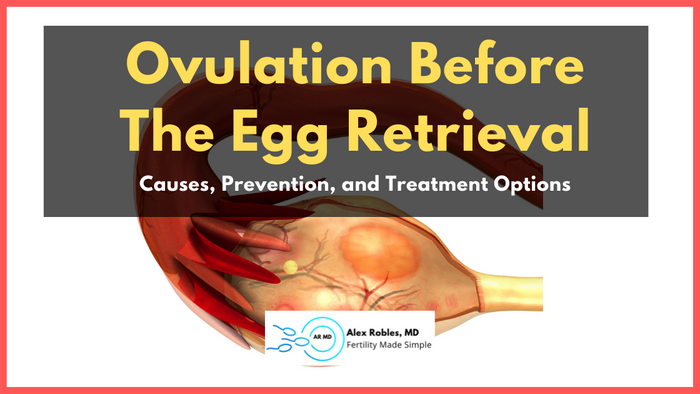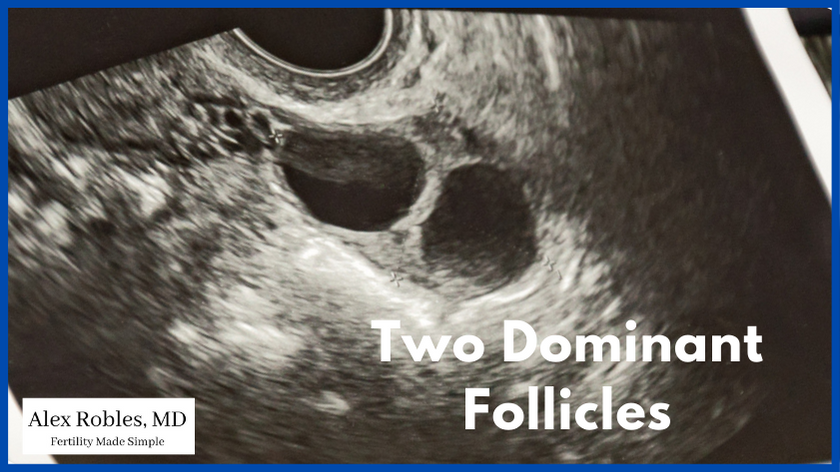Did you ovulate before your egg retrieval?
Unfortunately, premature ovulation is a rare and unexpected consequence that can happen during an in vitro fertilization (IVF) cycle.
In this article, you will learn:
- What is premature ovulation,
- why does it happen,
- and what to do to prevent it from happening again.
Let’s get started.

What Is Premature Ovulation?
Premature ovulation is when your eggs are released from the ovaries before we can collect them during egg retrieval.
Unfortunately, early ovulation often indicates that the treatment cycle failed. We cannot recover the eggs once they escape from the follicles.
Often, there are no clues that premature ovulation is happening.
What Causes Ovulation Before Egg Retrieval?
We do not always know why a patient ovulates early.
During an IVF cycle, we carefully time our medications and monitor the development of the follicles to ensure that everything is going as planned. However, some patients do not respond to the medications as expected and release the eggs before the usual timeline.
Risk factors include:
- Diminished ovarian reserve
- Advanced maternal age (40+)
- History of a short menstrual cycle
- Elevated blood levels of gonadotropins (FSH and LH)
- Not taking your trigger medications at the appropriate time
Also, physical trauma or sexual intercourse can cause premature ovulation mechanically.
Are There Signs That I Ovulated Early?
In some cases, there may be signs that ovulation has occurred before the retrieval.
These include:
- Unexpected pain or cramping hours before the procedure
- Changes to your vaginal discharge (thick and cloudy in appearance)
- Sore breasts
- Decreased estrogen levels after the trigger shot
- Increasing progesterone hormone levels during stimulation
- A lot of fluid in your pelvic cavity at the start of the procedure
However, it is common not to experience any symptoms.
What to Do If You Think You Have Ovulated Early
If you think you have ovulated before your retrieval, contact your doctors immediately.
Your doctor will likely perform a transvaginal ultrasound and blood tests to confirm whether the follicles are still present.
If your follicles are collapsed, we will cancel your cycle.

How Common Is It To Ovulate Before The Retrieval?
Fortunately, it is not common for patients to ovulate before oocyte retrieval.
At our clinic, fewer than 1% of all cycles will experience premature ovulation.
Can You Prevent It?
There are no surefire ways to prevent premature ovulation.
However, there are a few things that you can do to reduce the chances of it happening:
- Medication compliance: Follow your doctor’s instructions carefully and take all medications at the prescribed times
- Monitoring your follicles regularly with ultrasounds and blood work
- Avoid activities that could cause physical trauma, such as strenuous exercise or sexual intercourse
- Taking your trigger medication at the exact time that we tell you to
- Arriving on time on the day of the egg retrieval procedure
How We Use Medications To Time Ovulation
We use a combination of fertility drugs during an IVF cycle to both prevent ovulation and induce ovulation when appropriate.
Let’s go over them in more detail.
Ovulation Suppression
During the ovarian stimulation phase of an IVF cycle, we use special medications to prevent ovulation. The most common class of drugs is a GnRH antagonist (such as Ganirelix or Cetrotide).
This medication aims to prevent your pituitary gland from secreting Follicle Stimulating Hormone (FSH) and Luteinizing Hormone (LH), the latter of which is the catalyst for ovulation.
As such, the antagonist will allow multiple eggs to grow without the risk of premature release.
Other medications, such as Lupron (a GnRH agonist), can also prevent ovulation in specific IVF cycles.
Ovulation Induction
Once we determine that your follicles have developed appropriately, we will administer another medication called the trigger shot (Human Chorionic Gonadotropin (hCG) or Lupron).
The trigger injection simulates the LH surge, which is necessary for egg maturation.
However, trigger shots also induce ovulation. Most patients will usually ovulate 36-37 hours after the trigger.
Therefore, we do the egg retrieval at the 35-36 hour mark to maximize the probability of your eggs being mature, but before your body releases the eggs.
Other Related Questions
Does The Egg Retrieval Typically Happen During Ovulation?
No, we perform the egg retrieval right before ovulation. The goal is to perform the procedure at the 35-36 hour mark following your trigger shot. This timing ensures that your eggs are mature and ready for collection, but before they have a chance to be released from the follicles.
At What Size Do Follicles Ovulate Naturally?
A follicle typically ovulates once it reaches 18-22 mm in diameter. However, follicle size varies from person to person. Some women may experience ovulation even with follicles smaller than 18 mm.
Can I Still Become Pregnant If I Ovulate Early?
Yes, it is possible to become pregnant after premature ovulation. Often, we offer intrauterine insemination (IUI) for patients who ovulate early. The reason is that there is a chance that the eggs are in the fallopian tubes and are still viable for fertilization with sperm.
The overall success rate of an IUI varies between 5 and 15%.
However, if you were planning on doing IVF to test the embryos or freeze them for future use, you cannot do this with an IUI cycle.
Also, you may be at risk of twins or triplets depending on the number of ovarian follicles you release.
Conclusion
Premature ovulation is a rare but potential complication of in vitro fertilization.
Most times, it indicates that the IVF cycle has failed.
If you have a history of early ovulation, don’t hesitate to contact your fertility doctor for further advice and treatment options.
They can help guide you through the process and determine how to best approach future IVF treatment.
Other Infertility Articles
- Frozen Embryo Transfer Cycles: What To Expect
- Pregnancy Testing After IVF: When To Do It & Why
- The Biological Clock: When Should A Woman Consider Fertility Treatment?
Make An Appointment With Dr. Robles To Discuss Your Fertility Options Today!

Alex Robles, MD
Dr. Alex Robles is a Spanish-speaking Latino-American Reproductive Endocrinologist and Infertility specialist in New York City, and a board-certified OBGYN. He has a special interest in health, lifestyle, & nutrition. Make an appointment with Dr. Robles to discuss your fertility options today!
